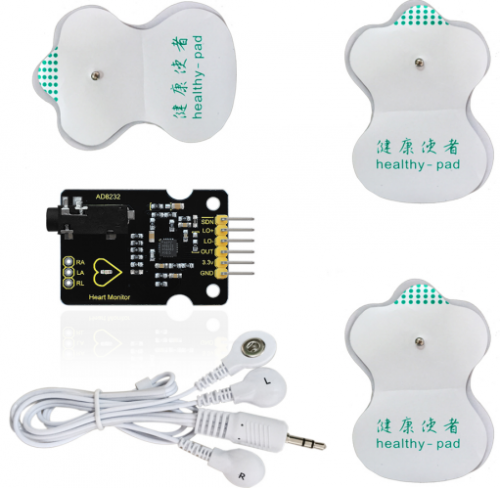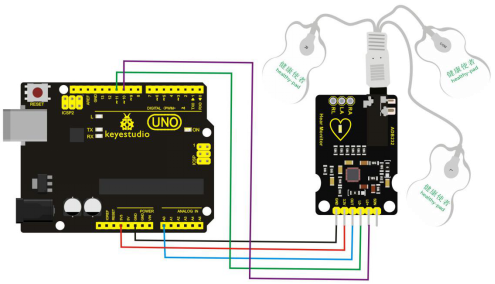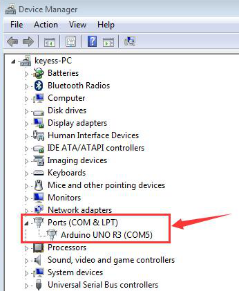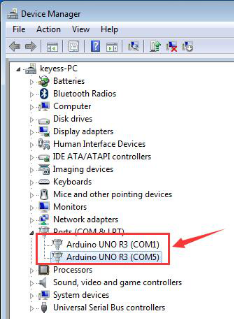Ks0261 keyestudio AD8232 ECG Measurement Heart Monitor Sensor Module
keyestudio AD8232 ECG Measurement Heart Monitor Sensor Module
Introduction
The AD8232 is an integrated front end for signal conditioning of cardiac bioelectrical signals to monitor heart rate. This is a low-power, single-lead and heart rate monitor front end for all types of vital signs.
Specification
- Power voltage:DC 3.3V
- Output:analog output
- Interface(connect RA, LA, RL):3PIN, 2.54PIN or earphone jack
- Size: 36mm * 31mm * 18mm
- Working Temperature:-40 ℃ to +85 ℃
Connection Diagram
Sample Code
1>burn the code to UNO board using arduino IDE
void setup() {
// initialize the serial communication:
Serial.begin(9600);
pinMode(10, INPUT); // Setup for leads off detection LO +
pinMode(11, INPUT); // Setup for leads off detection LO -
}
void loop() {
if((digitalRead(10) == 1)||(digitalRead(11) == 1)){
Serial.println('!');
}
else{
// send the value of analog input 0:
Serial.println(analogRead(A0));
}
//Wait for a bit to keep serial data from saturating
delay(1);
}
2>using processing software to find the program as below:
to find the program as below:
myPort = new Serial(this, Serial.list()[2], 9600);
This program,Serial.list()[2],9600,is to check the serial port of the computer you used,for
example,the below figure shows only one port, so it is Serial.list()[0],9600.
When the computer appears COM1 and COM5,COM5 is the UNO test of AD8232 board, so it shows Serial.list()[1],9600, you can refer to the below figure:
/****************************************************************************
Heart_Rate_Display.ino
Demo Program for AD8232 Heart Rate sensor.
Casey Kuhns @ SparkFun Electronics
6/27/2014
https://github.com/sparkfun/AD8232_Heart_Rate_Monitor
The AD8232 Heart Rate sensor is a low cost EKG/ECG sensor. This example shows
how to create an ECG with real time display. The display is using Processing.
This sketch is based heavily on the Graphing Tutorial provided in the Arduino
IDE. http://www.arduino.cc/en/Tutorial/Graph
Resources:
This program requires a Processing sketch to view the data in real time.
Development environment specifics:
IDE: Arduino 1.0.5
Hardware Platform: Arduino Pro 3.3V/8MHz
AD8232 Heart Monitor Version: 1.0
This code is beerware. If you see me (or any other SparkFun employee) at the
local pub, and you've found our code helpful, please buy us a round!
Distributed as-is; no warranty is given.
import processing.serial.;
Serial myPort; // The serial port
int xPos = 1; // horizontal position of the graph
float height_old = 0;
float height_new = 0;
float inByte = 0;
void setup () {
// set the window size:
size(1000, 400);
// List all the available serial ports
println(Serial.list());
// Open whatever port is the one you're using.
myPort = new Serial(this, Serial.list()[2], 9600);
// don't generate a serialEvent() unless you get a newline character:
myPort.bufferUntil('\n');
// set inital background:
background(0xff);
}
void draw () {
// everything happens in the serialEvent()
}
void serialEvent (Serial myPort) {
// get the ASCII string:
String inString = myPort.readStringUntil('\n');
if (inString != null) {
// trim off any whitespace:
inString = trim(inString);
// If leads off detection is true notify with blue line
if (inString.equals("!")) {
stroke(0, 0, 0xff); //Set stroke to blue ( R, G, B)
inByte = 512; // middle of the ADC range (Flat Line)
}
// If the data is good let it through
else {
stroke(0xff, 0, 0); //Set stroke to red ( R, G, B)
inByte = float(inString);
}
//Map and draw the line for new data point
inByte = map(inByte, 0, 1023, 0, height);
height_new = height - inByte;
line(xPos - 1, height_old, xPos, height_new);
height_old = height_new;
// at the edge of the screen, go back to the beginning:
if (xPos >= width) {
xPos = 0;
background(0xff);
}
else {
// increment the horizontal position:
xPos++;
}
}
}
Test Result
Using the software  to open the program,click
to open the program,click  key. Using three pads,R-end is stuck on the left chest, L-end is for the right chest, COM is stuck near the
stomach. It will appear the following pattern, and the LED light on the PCB board will flash with the heartbeat. In this way,you can make sure that the board is available.
key. Using three pads,R-end is stuck on the left chest, L-end is for the right chest, COM is stuck near the
stomach. It will appear the following pattern, and the LED light on the PCB board will flash with the heartbeat. In this way,you can make sure that the board is available.
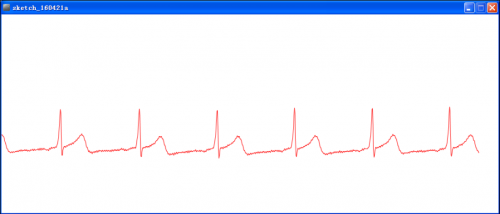
Resources
PDF:
https://drive.google.com/open?id=16Fhn8dVlzO9zI_uU0KmpTKqDGU3Rdw1q
Get Codes of All Project:
https://drive.google.com/open?id=1G3aJAjXGb_luWEfEi9N2BaujjLZIfi8I
Get Processing Software:
https://drive.google.com/open?id=1Zfw-xgq9KrXM2IFT3dSB0p_d4dXX-OG5
Get One Now
Official Website
http://www.keyestudio.com/keyestudio-ad8232-ecg-measurement-heartmonitor-sensor-module.html
